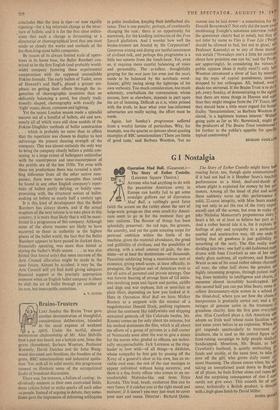Brains–Trusters
LAST Sunday the Brains Trust gave another demonstration of thoughtful, conscientious deliberation, islanded in the usual expense of weekend 0 0 spirit. Under the tactful, almost anonymous chairmanship of Mr. Alan Melville (not a pun was heard, not a larkish note, from this grave chameleon), Barbara Wootton, Professor Kennedy, David Daiches and Sir John Wedg- wood discussed anti-Semitism, the freedom of the press, BBC sensationalism and industrial spolia- tion. Yet, with all its solid merits, this programme seemed to illustrate some of the occupational faults of broadcast discussions.
There was, for instance, a failure of casting : in- dividually eminent in their own contrasted fields, these talkers failed to strike sparks off each other as people. Instead of arguing in debate, they some- times gave the impression of delivering soliloquies
in polite insulation, keeping their intellectual dis- tance. That is one penalty, perhaps, of continually changing the cast: there is no opportunity for teamwork, for the kindling intimacies, of the Free Speech gladiators. And I wonder how well the brains-trusters are feasted by the Corporation? Generous wining and dining are tactful insurances of civilised talk, and perhaps this programme is a little too remote from the lunch-hour. Yet, even so, it requires more careful balancing of voice and personality. The er-talker, thoughtfully groping for the mot juste (or even just the mot), needs to be balanced by the acrobatic word- fancier, glibly racing along the tightrope of his own verbosity. Too much consideration, too much solemnity, overballasts the conversation; whose success, here as elsewhere, depends in part upon the art of listening. Difficult as it is, when primed with the truth, to hear what your less-informed adversaries are really saying, the effort must be made.
Again, last Sunday's programme suffered from a woeful famine of particulars. Why, for example, was the quartet so demure about quoting examples of BBC sensationalism ('There are limits of good taste,' said Barbara Wootton, tut no
canons can be laid down'—a consolation for Donald Baverstock)? Not only did the team al mentioning Tonight's notorious interview (wl the questioner clearly had in mind), but they not refer by name to This is Your Life (Pe( should be allowed to feel, but not to gloat,' Professor Kennedy) or to any of those mull ous serials ('Nowadays one's a little bit restric about how primitive one can be,' said the Pro sor approvingly). In considering the virtues public opinion (does it really exist?) only Is Wootton introduced a sliver of fact by menti ing the topic of capital punishment, instal dropped by her colleagues. All, indeed, wer shade too universal. If the Brains Trust is to de job, every Sunday, of demonstrating to the sigh that there are more things in Heaven and et than they might imagine from the TV Times, t, they should have a little more regard for hun frailty. 'Sensationalism,' as Barbara Wootton dared, 'is a legitimate human interest.' With going quite as far as Mr. Baverstock, might the producers of The Brains Trust condescen bit further to the public's appetite for spec topical controversy?
RICHARD FINDLA"






























 Previous page
Previous page